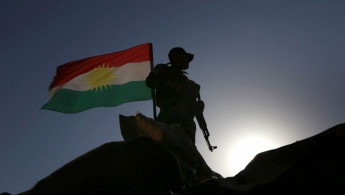Outrage in Iraqi Kurdistan over increase in killings by Kurdish armed forces
Public outrage is growing in the Iraqi Kurdistan region due to increasing rates of killings by Kurdish armed forces, despite disarmament laws stipulating that these forces should not enter urban areas with weapons.
The Kurdistan Regional Government (KRG) previously claimed that most crimes were committed with illegal firearms and launched a campaign in 2022 to register and collect unlicensed guns across the region. Yet, recent incidents involving registered guns carried by Kurdish forces have brought the issue to the fore.
The latest victim is Ari Rizgar, a young Kurdish man who ran a small teashop in Sulaimaniyah's Raparin neighbourhood. Rizgar was killed in cold blood by two men on Saturday night, reportedly after a verbal altercation. His death has ignited widespread public anger over Kurdish security forces entering urban areas armed.
The Directorate of Security in Sulaimaniyah announced the arrest of two suspects in connection with Rizgar's murder. One of the suspects is a member of the Commando Forces, a specialised unit affiliated with the 70 brigades of the KRG Ministry of Peshmerga Affairs.
On July 16, another Kurdish youth, 16-year-old Sha Rawand Baba Ali, was killed in the same neighbourhood under similarly troubling circumstances, reportedly by a Kurdish officer. A source within the Directorate of Security in Sulaimaniyah, speaking anonymously, confirmed that both suspects in Rizgar's case are members of the Commando Forces.
A lawyer told The New Arab that according to binding laws, all Peshmerga forces must submit their weapons to their military units after completing their duties and returning to urban areas.
TNA contacted Bakhtyar Mohammed, the secretary general of the KRG Peshmerga Ministry, but he was not immediately available for comment.
Lahur Sheikh Jangi, former co-president of the Patriotic Union of Kurdistan (PUK) and current leader of the newly established People’s Front political party, accused senior PUK leaders of destabilizing Sulaimaniyah’s security. Speaking to Zoom Media, a local channel seen as close to him, Jangi stated, "Unfortunately, what is now happening in Sulaimaniyah cannot be seen anywhere else in the world. According to the law, Peshmerga and Counter-terrorism forces are not allowed to enter cities to arrest and kill people. Local security and police are responsible for arrests based on judicial warrants."
Ari, a #Kurdish youth, ran a small teashop in #Sulaimaniyah's Raparin neighborhood. Last night he was killed in cold blood by two men, reportedly after a verbal quarrel over serving tea. Security forces have arrested two suspects, one of whom is a member of PUK's Commando Forces. pic.twitter.com/V9fiXaRi2W
— Dana Taib Menmy دانا طيب منمي (@danataibmenmy) July 28, 2024
Jangi also refuted claims that the incidents are related to illegal gun ownership and blamed PUK President Bafel Talabani and his brother Qubad Talabani, the KRG deputy prime minister, for the deteriorating security situation. He urged the people of Sulaimaniyah not to accept the current conditions.
Jangi, who announced his exit from the PUK's ranks last year, is participating in the region's upcoming parliamentary elections slated for 20 October. Some Kurdish observers have suggested that Rizgar, the victim, was a loyalist to Jangi and that the assassination was aimed at terrorizing Jangi's loyalists and voters ahead of the election.
Efforts to reach Samir Hawrami, spokesperson for Qubad Talabani, were unsuccessful. In a statement, Bafel Talabani expressed condolences to Rizgar's family, describing the victim as a "martyr" and the incident as a "big crime." He urged security forces to take legal action against the perpetrators and vowed that “there would be no amnesty for anyone in whatever positions who jeopardize the lives and stability of people.”
The KRG, an alliance of the Kurdistan Democratic Party (KDP), the PUK, and the smaller Change Movement (Gorran), has been working with the global anti-ISIS coalition to unify all Kurdish forces under the KRG’s Ministry of Peshmerga. Despite these efforts, progress has been slow, and both major parties maintain separate Peshmerga forces, security, and intelligence agencies. 70 brigades are affiliated to the PUK, while 80 brigades are taking orders from the KDP.
The region experienced an internal conflict from 1994 to 1998, resulting in thousands of deaths, injuries, and displacements.
The incidents have raised serious concerns about the enforcement of disarmament laws and the role of Kurdish armed forces in maintaining public security in urban areas.




 Follow the Middle East's top stories in English at The New Arab on Google News
Follow the Middle East's top stories in English at The New Arab on Google News
![A group of Palestinians, foreign and Israeli activists gather to participated in an olive picking event on the land in the town of Battir, which is under threat of confiscation by Israel in Bethlehem, occupied West Bank on 8 November 2024. [Getty]](/sites/default/files/styles/image_330x185/public/2182930803.jpeg?h=199d8c1f&itok=__0LgGsa)

![People gathered around the rubble of destroyed houses to search for survivors [Getty]](/sites/default/files/styles/image_330x185/public/2024-11/GettyImages-2184733820.jpg?h=199d8c1f&itok=NiM1LO2f)